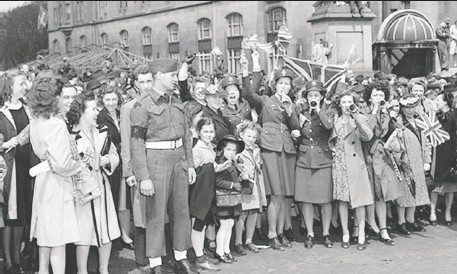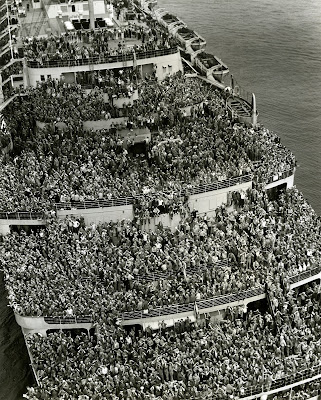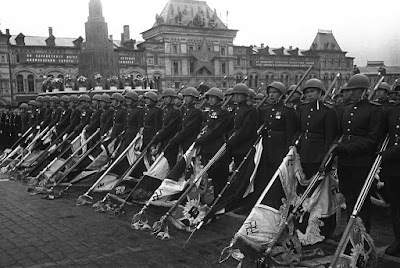Seventy-five years ago, servicemen and women who believed that the Second World War would drag on were thrilled to learn that with Nazi Germany's capitulation, the war in Europe was over.
For some of them, they would be returning home:
Like so:

But not everyone could be so exuberant:
While some returned home, some had no home to return to.
Most of us cannot imagine the stoicism in the face of imminent death and destruction or the possible loss of loved ones abroad. We readily brighten to the film and photographs of unbridled joy in crowds celebrating a long war's end even if we cannot fully comprehend what preceded it.
That we cannot re-enact that joy in the streets now weighs upon us. We can only remember at home what it must have been like to know the first moments of a world at peace.
For some of them, they would be returning home:
“We didn’t believe it,” said Smith, who turns 96 next week and lives in Britannia. “Even when the news was confirmed, it seemed to fall flat. We expected guns, ringing bells, brass bands, but for a few hours nothing much happened. We continued half-heartedly to sweep the screens, maybe there was a stray German submarine that hadn’t got the news.
“Then at the end came the reaction — the joy, the liberation. We lit bonfires and danced around them. The CO (commanding officer) was lifted onto shoulders and cheered and many a pint was downed in the local pubs.”
It wouldn’t be until the next day, at 3 p.m. on Tuesday, May 8, 1945, that British prime minister Winston Churchill officially proclaimed “Victory in Europe Day.” In Ottawa, as elsewhere, people had already been partying for 24 hours in what the Ottawa Citizen described as “the greatest mass demonstration of relief and joy ever to be witnessed in Canada’s Capital.”
Like so:

 |
| Americans returning home from the war (source) |
 |
| The Red Army lowers the Nazi standards during a Victory Day parade (source) |
But not everyone could be so exuberant:
A Toronto publisher’s much-praised book on the Holocaust has been reissued and expanded to mark the 75th anniversary of the liberation of Europe from Nazi rule.
Second Story Press says its book “Witness: Passing the Torch of Holocaust Memory to New Generations” now includes invisible barcodes embedded in every photo of a survivor, rescuer or liberator that can take the reader online to video of their testimony.
While some returned home, some had no home to return to.
Most of us cannot imagine the stoicism in the face of imminent death and destruction or the possible loss of loved ones abroad. We readily brighten to the film and photographs of unbridled joy in crowds celebrating a long war's end even if we cannot fully comprehend what preceded it.
That we cannot re-enact that joy in the streets now weighs upon us. We can only remember at home what it must have been like to know the first moments of a world at peace.
No comments:
Post a Comment